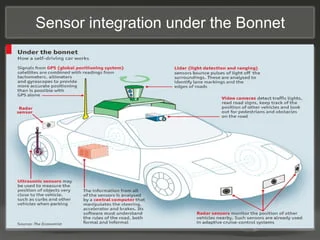The advent of autonomous vehicles (AVs) has revolutionized the transportation industry, pushing the boundaries of technology and innovation. As tech giants and automobile manufacturers work tirelessly to perfect self-driving systems, the global market is on the brink of transformation. This blog delves into the latest developments in autonomous vehicles and explores their prospects.
Recent Advancements in Autonomous Vehicle Technology:
The field of autonomous vehicles has witnessed several groundbreaking advancements in recent years, making self-driving cars safer and more efficient:
1. Enhanced AI and Machine Learning Algorithms
Modern AVs leverage sophisticated artificial intelligence (AI) and machine learning algorithms to process data from sensors, cameras, and LiDAR systems. These improvements enable real-time decision-making, ensuring safer navigation in complex environments.
2. 5G Connectivity
The integration of 5G networks has drastically improved vehicle-to-everything (V2X) communication. This advancement allows AVs to share real-time data with other vehicles, traffic infrastructure, and pedestrians, reducing the risk of accidents and improving traffic flow.
3. Advanced Sensors and LiDAR Systems
Sensors and LiDAR technology have become more compact and cost-effective, enhancing the perception capabilities of AVs. These systems provide a 360-degree view of the vehicle’s surroundings, making them adept at identifying obstacles and navigating urban and rural areas.
4. Legislation and Testing
Governments worldwide are increasingly supporting autonomous vehicle initiatives. For instance, the United States, the UK, and Germany have introduced regulations to facilitate the testing and deployment of self-driving cars. Autonomous delivery robots and robotaxis are already being piloted in select cities.
Future Prospects of Autonomous Vehicles:
The future of AVs is filled with opportunities and challenges, promising to reshape our daily lives and global economies:
1. Redefining Urban Mobility:
Autonomous vehicles are expected to reduce traffic congestion and improve urban mobility. Ride-sharing services, powered by AV fleets, will make transportation more affordable and accessible.
2. Environmental Benefits:
With the rise of electric autonomous vehicles, the shift towards eco-friendly transportation will contribute to lower carbon emissions. AVs’ ability to drive more efficiently than human drivers further enhances fuel efficiency and reduces pollution.
3. Economic Growth:
The autonomous vehicle industry is poised to generate billions of dollars in revenue, creating job opportunities across sectors like software development, manufacturing, and infrastructure.
4. Safety Improvements:
One of the most significant benefits of AVs is the potential to drastically reduce traffic accidents caused by human error. AVs aim to make roads safer for everyone by relying on advanced AI and constant connectivity.
5. Integration with Smart Cities:
Autonomous vehicles will play a vital role in the evolution of smart cities. Seamless integration with intelligent traffic systems, energy-efficient charging stations, and shared mobility services will create a more interconnected urban ecosystem.
Challenges Ahead:
Despite the promising prospects, several challenges must be addressed before autonomous vehicles become mainstream:
Regulatory Hurdles:
Uniform global regulations are necessary to streamline the testing and deployment of AVs.
Ethical Dilemmas:
Decision-making in critical situations, such as accident scenarios, raises ethical questions for developers and policymakers.
Cybersecurity Risks:
Ensuring the security of connected systems is crucial to prevent hacking and data breaches.
High Costs:
The initial cost of developing and deploying AVs remains a significant barrier to widespread adoption.
Conclusion:
Autonomous vehicles represent a paradigm shift in how we view transportation. As technology advances, the benefits of AVs—from safer roads to sustainable mobility—are within reach. However, overcoming regulatory, ethical, and technical challenges will determine how quickly we can embrace this futuristic mode of travel.
For businesses and individuals alike, staying informed about the latest developments in autonomous vehicle technology is essential. Autonomous vehicles are poised to lead the way as the world moves toward smarter, more efficient transportation solutions.



